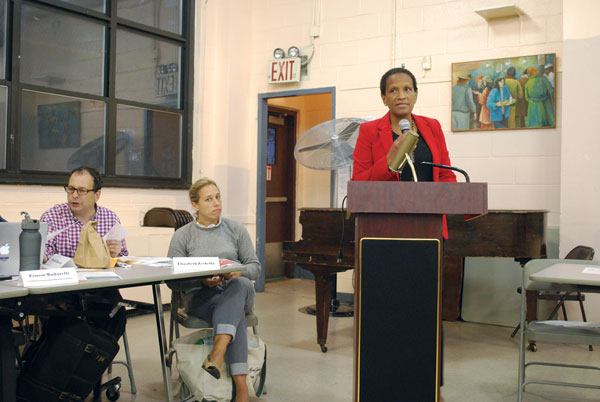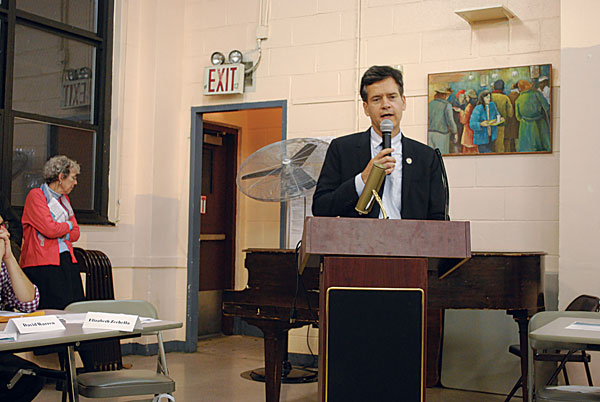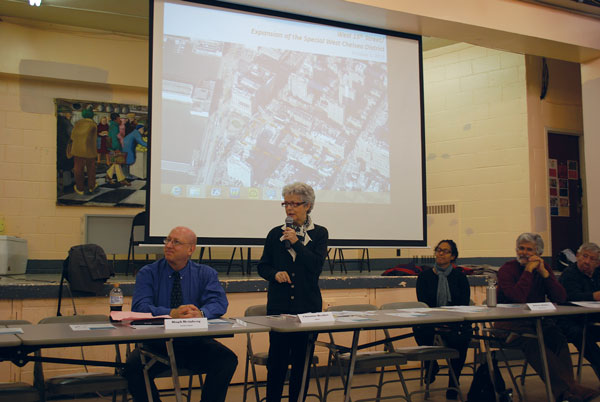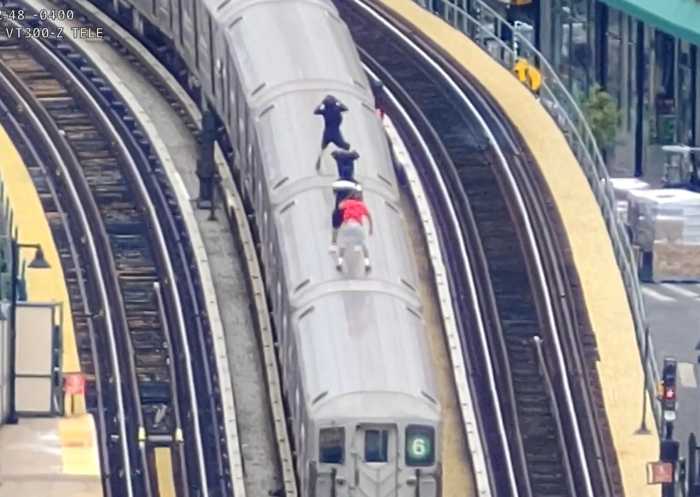
Rose Pierre-Louise, commissioner of the Mayor’s Office to Combat Domestic Violence, draws attention to Chelsea crime statistics.
BY WINNIE McCROY | The Chelsea community came together on Oct. 1 at the Fulton Auditorium for the monthly full board meeting of Community Board 4 (CB4). Top issues included presentations on domestic violence, the Special West Chelsea Rezoning of W. 15th St., and the Balanced Business Policy.
“If you don’t think domestic violence is happening in this community, I’m here to let you know that it is,” said Rose Pierre-Louis, commissioner of the Mayor’s Office to Combat Domestic Violence. “Thirty percent of crime in NYCHA housing is DV-related. In 2013, 4,000 reports were filed in CB4 — 11 per day. Since 2002, there have been 15 DV-related homicides in CB4. And 121 of 573 felony assaults in CB4 are DV-related; almost a quarter.”
Pierre-Louis said that the takeaway from the incident involving NFL player Ray Rice incident was the teachable moment allowing youth to see the dynamics of unhealthy relationships. She referred people to the Family Justice Centers in each borough, including the renovated Manhattan office, co-located with DA Cyrus Vance’s Special Victims Unit, dealing with DV, elder abuse and trafficking.
“Last year there were 280,000 DV reports filed with NYPD,” said Pierre-Louise. “What’s good about this is it indicates people are reaching out for help. But we don’t have a sense who is going to other resources beyond the FJC, whether it be counseling or the emergency room.”
Pierre-Louise noted connections between DV, homelessness and child abuse, saying that it cut across the very fabric of the city, as the 24 percent of New Yorkers who live with high poverty and low unemployment accounted for 42 percent of domestic violence cases last year.
CHELSEA SAYS ‘NO’ TO HIGH-RISES
After the kerfuffle caused by Jamestown Properties’ wildly unpopular expansion atop the Chelsea Market, CB4 has been eager to prevent similar situations. To that end, the Chelsea Land Use Committee has applied to incorporate areas into the Special West Chelsea District (SWCD), to ensure that new buildings adhere to the character of the neighborhood.
The rezoning would affect 11th and 12th Aves., btw. W. 27th and W. 30th Sts., the Chelsea Market block, 85 and 99 10th Ave. and the south side of W. 15th St., btw. Ninth and 10th Aves.
Among the amendments are strengthened street wall requirements, setbacks, building heights capped at 135 feet, and unenclosed sidewalk cafes permitted on wide streets.
Karolina Greboweic-Hall, planner liaison to CB4 and CB7 from the Department of City Planning, said the community is looking for ways to regulate the corridor of W. 14th/15th, btw. Ninth and 10th Aves. The M1-5 zoning district has no height restrictions, threatening the existing character of the neighborhood.
“Under current regulations, a building could have unlimited height,” said Greboweic-Hall. “But with M1-5 laid over this Special West Chelsea District, buildings would have to adhere to a base height of 50–95 feet, capped at 135 feet. Setbacks are 15 feet on narrow streets, 10 on wide, and it doesn’t involve changes to existing permit density. It is in line with the Chelsea Market, and an appropriate transition from the Meatpacking District to West Chelsea.”
VORNADO WANTS TO GO HIGHER
These proposed changes don’t sit well with Vornado Realty Trust, who, along with Aurora Capital Associates, wants to build a 190-foot office tower on the Prince Lumber site, just north of the Apple store. They came out in force to argue for their proposal.
“You are probably looking at me as a big, bad developer with no regard for the neighborhood. But we selected Aurora Capital because they’ve built ten buildings here,” said David Greenbaum, president of the New York Office Division of Vornado Trust. “We ask your assistance to build a great building we all can be proud of. We understand your concerns… and we want to be clear that we don’t want to build another hotel in your neighborhood; we would like to build an office building.”
Greenbaum said that they were not asking for upzoning, were unopposed to a height limit, and were sympathetic to the community’s anger over the midblock [Chelsea Market] tower.
Geoff Smith, vice-president of development for Vornado, added, “We are confident this will allow us to build a great building we’re proud of, to create an influx of office workers.”
Jared Epstein, a vice president with Aurora Capital, urged the community to rethink the height limit, saying it would “force them to put up a hotel with a nightclub and restaurant, which is not what the community or what we want.” He said that their 190-foot tower would be more contextually consistent with the soaring midblock hotel.
Jim Power of Kramer Levin Naftalis & Frankel LLP argued that corner lots should be allowed to rise higher than midblock lots, and that the proposed height and setback restrictions were “inappropriate and inconsistent with those principles.”
And Harry Kendall, a CB4 resident and partner in BKSK Architects LLP, said that after Vornado and Aurora had asked them to look at the site, he agreed that “The new building needs to reflect the architectural style of the neighborhood, and we quickly came to the feeling that distinctive masonry and good ceiling heights are necessary to sculpt this building. Height is not the problem here. Good architecture is.”
During the public session, 19th St. resident Frank Lowe reminded CB4 that Jamestown had used similar tactics, saying, “I don’t think we should allow ourselves to be swayed by the threat of another hotel. We made the mistake to allow Jamestown to increase the bulk of their building, and there’s no reason to allow Vornado to. This should be cut back at the knees.”
CB4 member Lee Compton said, “I don’t think that a 265-foot hotel that slipped through should define the rest of the neighborhood.”
Board members agreed, noting in their letter that they “reject the argument that the out-of-scale midblock hotel under construction should establish the new context for the block. We only regret that this action comes too late to prevent that particular building.”
CB4 voted unanimously to recommend adoption of the SWCD.
ELECTED OFFICIALS REPORT
Congressman Jerrold Nadler informed the community that he was against arming the Syrian rebels, adding that a president should not be allowed to declare war without a Congressional vote.
“I voted against the appropriation of funds for arming Syrian rebels because I worried about this authorization of war, and secondly, because there are questions,” said Nadler. “Who are these moderate Syrian rebels, and how do we know these arms won’t be turned against us or our allies?”
Nadler said ISIS was not a direct threat to the U.S.; the issue was that “people from the U.S. or England will go train with ISIS and return here to commit murder and mayhem. That threat cannot be dealt with by the military in the Middle East, but with border control… not with boots on the ground, but by doing what we are doing.”

State Senator Brad Hoylman argues for revising the Hate Crimes Law.
State Senator Brad Hoylman talked about foreign real estate owners who leave buildings vacant for upwards of 10 months a year, paying no tax.
“The idea was to capture some of that revenue with a pied-à-terre tax of .5 percent for the first million, and max out at a top rate of 4 percent for properties of 20 million or more,” said Hoylman. “Some are telling me the sky is going to fall, that I’ve cast a chill over real estate, that foreign investment will turn away from New York. I’ve touched a nerve, and I’m proud of that. This will only impact two percent of properties, but could generate $660 million in revenue.”
Hoylman also referred to last year’s “Summer of Hate,” with nine people injured or killed in bias-related crimes, and asked the Comptroller’s office to revise the Hate Crimes Law.
“You can’t manage what you can’t measure, so we asked the comptroller to look at the way the NYPD collects hate crime data, and create action plans around bias-related crimes,” said Hoylman. “No one is funneling it to the right person to create this policy. We recommended that the NYPD make a tracking system, do training related to record keeping, and do periodic hate-related trainings. The great news is that the NYPD accepted these recommendations and are working to implement them.”
Other elected officials sent their representatives. Assemblywoman Linda Rosenthal’s office said that they would provide free flu shots on Oct. 23.
Councilmember Corey Johnson’s office invited all to brainstorm on how to spend $1 million set aside for the community needs. On Oct. 9 at the FIT High School auditorium, he will lead a series on affordable housing.
Congresswoman Carolyn Maloney worked to extend the Debbie Smith Act, an important piece of legislation in combatting rape, and provide federal funds to assess the 400,000 backlog of unprocessed rape kits. Maloney also introduced legislation to prevent arbitrary limits being set on multifamily housing mortgages.
A representative from Governor Andrew Cuomo’s office invited all to FIT on Oct. 15 for National Guard training in emergency preparedness, including a backpack of supplies with a flashlight, first aid kit and AM/FM radio.
CHELSEA WANTS BALANCED BUSINESSES
First Vice Chair Hugh Weinberg headed the public session, during which many community members voiced support for CB4’s new Balanced Business Policy, an attempt to meter the high concentration of alcohol-serving establishments with needed retail shops.
Manhattan Plaza resident Douglas Leland said that he visited a friend near Flaming Saddles, and had to close the window to hear over the “free-for-all.”
“And Bartini on Tenth Avenue has so much noise, I don’t know how people live there,” said Leland. “I urge you to act on legislating the noise in these bars.”
Kathleen Treat commended CB4, saying she’d like to see a toy store in the neighborhood, and Allison Tupper wanted to “keep the ones we have, but we need lots of different businesses.”
Gwen Arment, co-chair of the HK5051 Block Association, believed the area was oversaturated with bars, and was “very disturbed by the lack of enforcement and disregard of complaints by DCA [Department of Consumer Affairs], SLA and DOB. We desperately need this policy to ensure primarily residential neighborhoods are not compromised further by liquor establishments.”
Susan Lahn of the W. 58th St. Block Association encouraged the policy be adopted, and hoped community concerns about losing affordable retail would be taken under consideration.
Secretary Frank Holozubiec explained that it would limit the concentration of alcohol-serving establishments and attract a diversity of other businesses. A recent survey found that in CB4, 28 percent of retail footage was given to liquor establishments.
JD Noland suggested that the committee strengthen the language, and Jay Marcus worried the policy impacted businesses they had traditionally supported, such as quiet wine bars over loud clubs.
“I also don’t agree that we should turn down any clubs not willing to close by 2 a.m.,” he said. “I think it’s too broadly worded, anti-nightlife, and should be a much narrower set of recommendations.”
Holozubiec said the policy would not substitute for a case-by-case determination of businesses, but was meant to put constituents on notice.
Compton noted that CB4 had struggled for years to come up with a consistent approach, and called the policy, “a flawed document, but a very good attempt…and we should give it a try and amend it as a living document.”
Burt Lazarin asserted that without such a policy, approval of new nightclubs would happen, “piece by piece, and a few years later we will have a new neighborhood and demographic we weren’t thinking about.”
Paul Seres cautioned that whenever CB4 adopted policies or guidelines, they “tend to get thrown back into our face when the community is unhappy with decisions we make. It’s a great first step, but some language changes need to be tightened up.”
In the end, CB4 voted overwhelmingly to pass Item 14, the Balanced Business Policy, with Noland’s changes incorporated.
Other community members had concerns about traffic, with Leland noting the danger at 42nd St. & Ninth Ave. and urging additional signage. Elderly 24th St. resident Fanny Cole said the M34/A selective service buses had to go, saying, “We’ve been selected to be suckers! It takes a half an hour for the bus to come.”
Peter Mullan, executive vice-president of Friends of the High Line, invited all to enjoy the northernmost section, opened several weeks ago.
“We give a big ‘thank you’ to the board for helping to make this happen, and note that the new section doesn’t have lighting, so it has to close earlier. Please come and enjoy it,” he said.

CB4 chair Christine Berthet (standing) and board members discussing the expansion of the Special West Chelsea District.
OTHER AGENDA ITEMS
As the Meeting Agenda proceeded, Chair Christine Berthet noted that Item 17, a letter to Silverstein regarding tenant issues, would be sent as an administrative letter. Item 18, about affordable housing, was tabled.
CB4 members were pleased that a working group had successfully moved bus pick-up points past 10th Ave., and voted to support Item 13, a letter to the DOT and NYPD about the Jitney Bus Operation on W. 42nd St.
They asked that operators apply for the appropriate DOT permit, and change their locations so as not to impede access to the Lincoln Tunnel or impact local traffic.
Berthet bundled items, including letters to LPC allowing the Burlington Coat Factory to keep its too-large sign until they vacate, and to deny a front door replacement at 333 W. 20th St.
They also bundled Items 4-8, and voted to support letters to SLA regarding liquor licenses for bars, and Item 9, supporting a thank-you letter to Johnson for providing $1.6 million in capital funding for parks.
The Transportation Committee approved several letters to the DOT and DCA regarding the midtown protected bike lane, art from bridges on W. 45th St., btw. 10th and 11th Aves., and a newsstand application.
Rubin noted that bike lanes shouldn’t be governed by a one-size-fits-all blanket rule, and an amendment was made to address bike education, to be specific about which streets get bike lanes, and to ensure they weren’t placed on small streets.
Noland, concerned about two recent high-profile bike deaths, said that bicyclists must observe traffic rules, and Berthet suggesting asking the 10th Precinct to better enforce those rules.
Items 15–16 regarding affordable housing applications were put on hold, and Items 17–18 were tabled. CB4 voted unanimously to send a letter to the DCA regarding Item 19, Giovanni Rana’s sidewalk cafe outside Chelsea market, urging them not to renew their permit due to overcrowding.
The board passed Item 20, a letter thanking Hoylman for legislation publicizing stipulations agreed to by liquor serving establishments, and to increase funding for additional SLA investigators.
The final issue, Item 21, was a request for the NYPD to permit a ride-along for spot inspections of liquor-serving establishments. After members voiced concerns, CB4 agreed that the letter should be redirected to the SLA, and ultimately tabled the issue.
The next full board meeting will be held at 6:30 p.m. on Nov. 5 at Roosevelt Hospital, 1000 10h Ave. For more information, visit nyc.gov/mcb4 or send an email to info@manhattancb4.org.

































